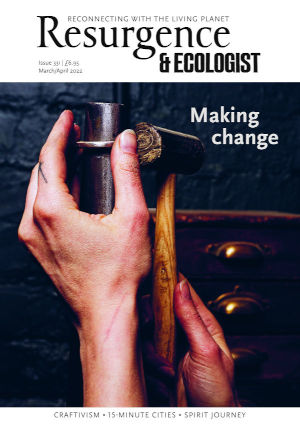Unusual in its clear style, Psychological Roots of the Climate Crisis explains why the same system that produces financial crashes and speculative bubbles also produces the climate emergency, on the way discussing what predisposes people to prefer populist leaders like Donald Trump and Boris Johnson. Sally Weintrobe is a psychotherapist capable of crossing boundaries between climate science, economics and psychology without a break in her stride or a word of jargon, and with plenty of examples from everyday experience. Our human tendency at times to regard ourselves as exceptions and entitled to short cuts is treated with sympathy. She notes how we keep ourselves in order with a sense of fairness: everyone has to take their turn, think about others’ entitlements and needs as well as their own. Frameworks of care – such as laws, safety rules, financial regulations, the NHS, liability for doing harm – remind us of this balance.
Except that under neoliberalism we are encouraged not to. Neoliberalism is the ideology that wants a small state and light-touch (if any) regulation, and supports low taxes, but expects the government to bail out businesses and banks when they get into difficulty. It encourages us to think we should have what we want whenever we want it; it tends to blame victims for their own misfortune and creates a ‘culture of uncare’, validating rising inequality and everyday selfishness. It seeks to deal with our anxieties, not by providing security and rights, but by training us through advertising to cope with unhappiness by purchasing and aspiring to purchase more.
We learn in Weintrobe’s book how consciously this ideology was nurtured by the wealthy through think tanks, lobbyists and political donations. For example, even when Exxon Mobil saw exactly how its product would change the climate, it paid academics to cultivate doubt about climate science and financed politicians who agreed with this position. The long-term impact of this coordinated cultural assault was that cultures of care (such as financial regulation in the early 2000s, and environmental regulations under Trump) were rolled back.
Weintrobe contrasts the unbridled exceptionalism that says, “I’m entitled to have what I want, and have it now,” with Extinction Rebellion’s offering opportunities for people to face reality, to mourn loss and express sadness, and to act in response, responsibly, creating and illustrating a culture of care. She acknowledges the need for both system change and individual change. Neoliberal culture will try to lambast a culture of care as ‘woke’ or ‘politically correct’; it will tell us that countering the climate crisis will cost too much and will put people out of jobs, just as it argued that safety nets for people living in poverty are self-defeating. To protect Nature and overcome this disconnection from reality, this refusal of loss and culture of uncare, we will also need to work towards ending poverty, creating meaningful decent jobs, global fairness, and participatory democracy in businesses and government. The stakes are very high. And there is a place for all of us in internal and external work standing up for a culture of care, for ourselves, for each other, and for those whose voices are not heard.







